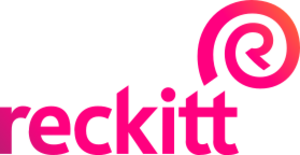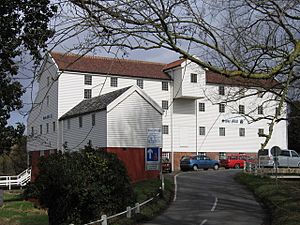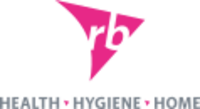Reckitt facts for kids

Reckitt's logo since 23 March 2021
|
|
|
Trade name
|
Reckitt |
|---|---|
| Public | |
| Traded as |
|
| ISIN | [https://isin.toolforge.org/?language=en&isin=GB00B24CGK77 GB00B24CGK77] |
| Industry | Consumer goods |
| Founded |
|
| Founders |
|
| Headquarters | Slough, United Kingdom |
|
Area served
|
Worldwide |
|
Key people
|
Sir Jeremy Darroch (Chairman) Kris Licht (CEO) |
| Products |
|
| Revenue | |
|
Operating income
|
|
|
Number of employees
|
40,000 (2024) |
| Subsidiaries |
|
Reckitt Benckiser Group PLC, which now goes by the brand name Reckitt, is a large British company that makes products for health, cleaning, and nutrition. You might know it from its former name, Reckitt Benckiser. The company is headquartered in Slough, United Kingdom.
Reckitt was created in 1999 when two companies, Reckitt & Colman plc from Britain and Benckiser N.V. from the Netherlands, joined together. This is called a merger.
You have probably seen many of Reckitt's brands in stores. These include the antiseptic brand Dettol, the pain reliever Disprin, and Strepsils for sore throats. They also make the toilet cleaner Harpic, the hair removal brand Veet, and the air freshener Air Wick. Other famous products are Calgon, Clearasil, Cillit Bang, Lysol, Enfamil, and Vanish.
Contents
How Reckitt Began
The company's story starts with two separate businesses that grew over many years before they came together.
The Benckiser Company
In 1823, a man named Johann Benckiser started a business in Germany that made industrial chemicals. A chemist named Ludwig Reimann joined the company and later took over the business.
Under the Reimann family, the company grew much bigger in the 20th century. It started making household products like the stain remover Vanish and Cillit Bang. In 1997, the company became public, which means people could buy shares of it on the stock market.
The Reckitt & Colman Company
The other half of the company started in 1840. Isaac Reckitt rented a mill in Hull, England, to make starch. Soon, he began making other household products. After he died, his sons took over the business.
In 1938, Reckitt & Sons joined with J. & J. Colman, a company famous for making mustard. This new company was called Reckitt & Colman Ltd. Over the years, they bought many other brands, including Dettol, Harpic, Airwick, and Lysol. This helped the company grow much larger, especially in America.
A New Company for a New Century
In December 1999, Reckitt & Colman and Benckiser NV officially merged to become one company. The new company's leader, Bart Becht, helped it become very successful. He focused on the most popular brands and on creating new products that customers wanted. This strategy worked well, and the company grew quickly.
Growing with New Brands
Over the next few years, the company bought several other businesses to add more famous brands to its collection.
- In 2005, it bought the part of Boots that made over-the-counter medicines. This deal brought in brands like Nurofen pain relievers, Strepsils throat lozenges, and Clearasil acne treatments.
- In 2010, it bought SSL International, the company that makes Scholl's footcare products.
- In 2012, it bought Schiff Nutrition, a company that makes vitamins and supplements like Airborne.
- In 2017, it bought Mead Johnson, an American company that makes baby formula.
Changes in Recent Years
In 2014, the company decided to shorten its name from "Reckitt Benckiser" to just "RB" to make it simpler. Then, in March 2021, it changed its brand name again to Reckitt, with a new logo.
The company has had a few different leaders, called CEOs. Rakesh Kapoor took over in 2011, followed by Laxman Narasimhan in 2019. In 2022, Narasimhan left, and Nicandro Durante became the temporary CEO. The current CEO is Kris Licht.
What Reckitt Does Today
Reckitt has offices in about 60 countries, and its products are sold in almost 200 countries around the world. The company divides its products into three main groups: health, hygiene (cleaning), and home.
Reckitt's plan is to focus on its most popular and successful brands. These top brands bring in most of the company's money.
Helping the Community and Planet
Reckitt supports charities like Save the Children. The company also started a program called Carbon 20. The goal of this program was to reduce the carbon footprint of its products by 20% by the year 2020. A carbon footprint is the total amount of greenhouse gases produced by making and using a product. As part of this effort, the company reduced the plastic in its Vanish cleaner packaging by 70%.
Images for kids
See also
 In Spanish: Reckitt Benckiser para niños
In Spanish: Reckitt Benckiser para niños
 | Shirley Ann Jackson |
 | Garett Morgan |
 | J. Ernest Wilkins Jr. |
 | Elijah McCoy |








